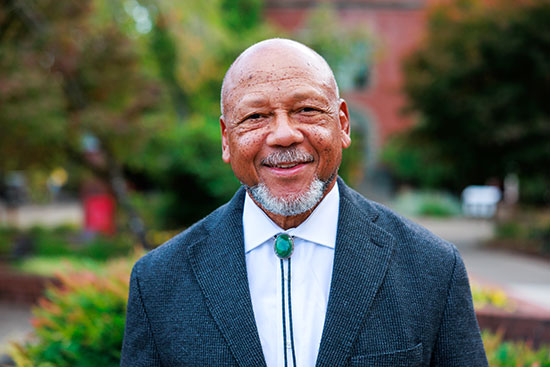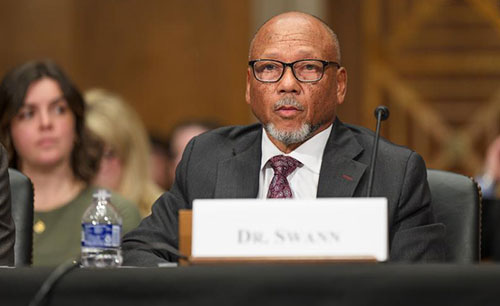 Over a nearly five-decade career as a practicing dentist, Brian Swann ’70 did his most impactful work outside of his two Bay Area offices.
Over a nearly five-decade career as a practicing dentist, Brian Swann ’70 did his most impactful work outside of his two Bay Area offices.
Swann has participated in dental outreach programs since his days as a graduate student. Upon joining the dental faculty at the University of California San Francisco, he participated in almost yearly service trips, primarily to Africa and the Caribbean, providing oral care to underserved populations and educating dentists.
The more that he participated in these service missions, the more Swann realized that this was his true calling.
“When I was away, I would never think about the office. And I knew that to run a business, you have to stay on top of things,” said Swann, who is now semi-retired and living in Greenback, Tennessee. “That was a sign that I had lost my interest in doing the business of dentistry. I wanted to dedicate the rest of my life and career to working in community dentistry, public health dentistry, integration of medicine and oral health, working on policy issues, advocacy issues and to try to change the way we’re doing things.”
So at age 58, Swann sold his practices and moved across the country to accept the Joseph L. Henry Fellowship to attend Harvard University’s T.H. Chan College of Public Health, where he earned his Master of Public Health in 2008. He was intent on reinventing himself and dedicating more of his life to serving those for whom oral care is hard to access.
Even in semi-retirement, Swann continues his mission of service and furthering the reach of oral care. His continued dedication to the cause has earned Swann the Pacific University Alumni Association’s 2024 Outstanding Alumni Award. The award recognizes alumni who have made significant contributions to their community or profession, recognizing individuals who have made tremendous accomplishments toward their life goals.
Since earning his Harvard degree, Swann has used his education to serve those who need oral care the most. Since 2008, he has served as the chief of oral health for the Cambridge Health Alliance, a nonprofit health system serving 140,000 patients in the Boston area. He continues to serve as an instructor of oral health in both Harvard’s School of Dental Medicine (HSDM) and Medical School and was recently accepted into the International College of Dentists.
Through both relationships, Swann has succeeded in bringing oral care services to Massachusetts’ underserved Native American community. In 2014, Swann helped create a partnership between the Cambridge Health Alliance, HSDM and the Wampanoag Tribe of Gay Head (Aquinnah) to provide oral care and education for tribe members and clinical hours for Harvard students. The partnership has made a difference for tribal numbers who struggle to access care in two of America’s most affluent regions.
“While a lot of celebrities have homes there, Cape Cod and Martha’s Vineyard are federally designated as underserved,” Swann said. “On Martha’s Vineyard, all of the dentists are cash only. The Native Americans, especially the elders and middle-aged people, had suffered greatly.”
Swann has also continued his service work, lecturing, providing care and helping build ongoing oral health programs in countries around the world and across the the U.S. through the Remote Area Medical organization. He is also serving the Cherokee Nation Eastern Band in North Carolina, making dentures for tribal members.
Swann has used his role at Harvard to advocate for greater integration of oral care in a coordinated wellness approach. In the Harvard Medical School, Swann was critical in adding oral health examination into the school’s medical core curriculum, culminating in the creation of an Oral Health Day. He has also lectured on his insights on oral health integration at dental and public health schools across the country.
 The role has also allowed Swann to advocate for oral care in front of Congress. He recently appeared in front of the United States Senate’s Health, Education, Labor and Pension Committee, testifying about issues of affordability, access, interdisciplinary training within institutions of higher learning with an emphasis on oral preventative education.
The role has also allowed Swann to advocate for oral care in front of Congress. He recently appeared in front of the United States Senate’s Health, Education, Labor and Pension Committee, testifying about issues of affordability, access, interdisciplinary training within institutions of higher learning with an emphasis on oral preventative education.
An integrated approach to oral care is not a new idea nor is it original. Swann saw it in action when his mother took a job as a dental assistant for a dentist in San Mateo, California. The dentist, the only Black dentist in the community, shared an office in a Victorian-style house with the only Black physician in town. The two worked together not only out of necessity but because it provided better care to patients.
Swann continues to advocate for that integrated model but he admits that the concept continues to present an uphill battle.
“Why don’t more doctors know that the bacteria that causes tooth decay and that gum disease is transferrable?” Swann asked. “Why don’t we know about the integration with medicine around diabetic patients, hypertension, pregnancy and heart disease? Why don’t we know how to diagnose oral cancer in the mouth?”
Swann credits Pacific with helping him hone in on his purpose while also learning to deal with adversity. Upon arriving in Forest Grove, he quickly decided on the pre-medical track and a career in dentistry over engineering and agriculture. Part of a growing Black population on campus in the mid-1960s, Swann was excited to come to college someplace completely different than where he grew up in the Bay Area.
Where adversity reared its head, however, wasn’t just in racial relations. It was also in the weather. The rainy winter and spring of the Pacific Northwest took some adjustment but Swann was happy with his decision.
“I was happy to just get into college anywhere,” he said. “I was too afraid to lose credits and go somewhere else. And so I stayed there, weathered the monsoons, and felt that I got a decent education in place that I would have never gone before.”
While dental care and oral health was not part of Pacific’s curriculum when Swann was a student, it is now part of the university’s comprehensive healthcare programs. The School of Dental Hygiene Studies educates with a primary focus on providing care to underserved populations. The school is also working on developing a curriculum for educating dental therapists in an effort to meet the shortage of oral health providers for underserved and rural populations, a prospect that excites Swann.
“It’s not a new model,” said Swann of dental therapists. “It’s been around for many decades, just in other parts of the world. I believe it originated in the Scandinavian countries where, in terms of healthcare outcomes, they ran way above us. A lot of places use them. America could use them as well.”
Swann takes satisfaction in having built programs that will benefit medical professionals, dentists and other oral care providers for years to come, knowing that they will benefit future providers long after he is gone. He takes the most satisfaction, however, in experiencing the impact of education, whether his own or what he has provided to others.
“The idea of learning and education breaks down a lot of the barriers that keep us from being in closer relations and communication in just about every way,” Swann said. “Knowledge can really change your perspective. We need that.
“I am not talking about TikTok. I am talking about being able to immerse yourself in another culture to some degree, learn from their perspective and not judging from your perspective. I think the greatest privilege is to be able to teach and share. I enjoy that quite a bit at this stage of my life.”